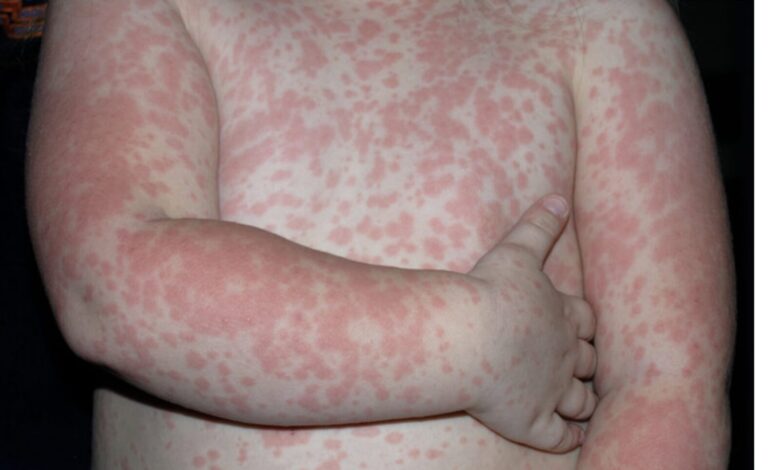ALLERGIC TO PENICILLIN? YES OR NO

“Penicillin allergy is the most reported adverse drug reaction.” That’s right; “approximately 10% of the US population has reported allergies to Beta-lactam antibiotics,” and in particular, penicillin. Ten percent of the population is a lot of folks who must be prescribed a more expensive, possibly less effective, and more toxic antibiotic because they think they are allergic to penicillin. Most “penicillin allergies” are self-reported meaning the patient noted some odd reaction one time when he/she was prescribed penicillin. From that they assumed they were allergic to it. The “allergy” could be a rash, a headache, nausea and vomiting, diarrhea, or any number of symptoms.
In reality, as many as 95% of “penicillin allergies” are actually side effects and not life-threatening anaphylactic reactions. The challenge for treating physicians is to determine which of these patients truly are at risk of anaphylaxis and which are not. Fortunately, anaphylaxis is a relatively infrequent event. Many physicians, myself included, question patients to find out exactly what type of reaction they experienced. If the patient tells you after a shot of penicillin he/she collapsed into shock and unconsciousness, no further analysis is needed. They are high risk patients, and penicillin should be nowhere near that person. If the patient had a red, measles-like rash, he or she is most likely ok and could probably take penicillin orally. If hives/urticaria is the reaction, that’s a “moderate risk history,” and the doctor needs to be cautious. Moderate and high risk histories command that the patient be tested in one of several ways to confirm or disprove the presence of true allergy.
Most people labeled penicillin-allergic are at low risk of harm from penicillin. The most specific and reliable test to rule out anaphylaxis is a skin test. In this test, a commercial solution containing penicillin (PRE-PEN) is injected into the skin, usually of the forearm. The test is done just like a TB skin test. If the person is allergic to penicillin, a red raised, itchy bump arises at the injection site within 15 minutes. This patient is truly penicillin allergic. If there is no reaction, the patient is not allergic and may safely take oral penicillin. Since penicillin reactions can cause anaphylaxis, it is imperative that skin testing be done in a setting where treatment for serious reactions is immediately available.
“Currently, the rate of [immune-related] penicillin allergies is decreasing” because parenteral (intravenous or intramuscular) penicillin is used infrequently. Reactions to oral penicillin still occur, but severe anaphylactic reactions “are rare.” Immune reactions to penicillin wane over time, and after 10 years, 80% of allergic patients become tolerant of penicillin.
In less worrisome, low risk situations, doctors are now using an oral amoxicillin provocation challenge test to assure themselves it’s ok to prescribe penicillin. In this test, the patient is given a dose of 250mg of amoxicillin orally. If there is no reaction, the patient is not penicillin allergic and can have that label removed from their record. This test is only done for those patients “at low risk”—they had a rash or other non-anaphylactic reaction.
In a study of 224 penicillin-allergic patients administered the amoxicillin challenge test, 162 (72%) were considered low risk. Twelve others were excluded for unknown reasons. Of the remaining 150, 56 (37%) had taken penicillin since their “reaction,” and were not given the amoxicillin challenge. Another 15 (10%) upon questioning did not have a history of allergy to penicillin—they were mis-informed. That left 79 patients to be challenged with amoxicillin. Thirty-eight refused the test. Of the 41 patients who took amoxicillin, none, zero, nada reacted to it. This study shows how many people are mis-labeled penicillin allergic, and when challenged with amoxicillin (a penicillin), prove not to be.
From a practical standpoint, I saw patients who claimed to be penicillin allergic every day. As the statistics state, it’s a very common problem. My routine was to ask the details of the reaction and then decide if the nature of it was enough to make me not prescribe penicillin. When you tell someone you think they may not truly be allergic to penicillin, not surprisingly, most of them still refuse to take penicillin in any form. They would prefer not to have whatever happened to them happen again. Most of those patients who agreed that maybe this was not a true reaction and took penicillin, did not have any adverse effect. I never did a skin test or an oral amoxicillin provocation challenge test for penicillin allergy so there were very few patients whose penicillin allergy claims I could refute. It was better to not cause trouble. If I had had skin testing available, I’m certain I would have used it. Skin testing has a 95% predictability and reliability.
In summary, careful history taking, skin testing, and the oral amoxicillin provocation challenge test are surefire ways to be certain the patient who claims to be allergic really is or is not. Using these methods improves medical treatment and lowers medication costs. It allows doctors to use an inexpensive, time-tested drug safely without fear of severe reaction.
References: Zembles T, Mitchell M, Alqurashi W, Castells M, Phillips EJ, Vyles D. Skin testing for Penicillin Allergy: a review of the literature. Curr Allergy Asthma Rep 2021 Mar 18;21(3):21.
Bland CM, et al. A practical guide for pharmacists to successfully implement penicillin allergy skin testing Am J Health Syst Pharm 2019 Jan 25;76(3):136-147.
Schafer JA, Mateo N, Parlier GL, Rotschafer JC. Penicillin allergy skin testing: what do we do now? Pharmacotherapy 2007 Apr;27(4):542-545.
Shenoy ES, Macy E, Rowe T, Blumenthal KG. Evaluation and management of penicillin allergy: A Review JAMA 2019 Jan 15;321(2):188-199.
Livirya S, et al. Oral amoxicillin challenge for low risk penicillin allergic patients. Int Med J 2022 Feb;52(2):295-300.
Am Fam Phys 2024 Apr; AFP Clinical Answers: “Is an amoxicillin oral provocation challenge test safe and accessible….” Vol 109(4):312.



